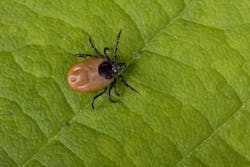TruGreen Releases "Top Ten Buggiest Cities" List
By the nature of their jobs, professional arborists spend the majority of their work days outdoors. As such, they may be susceptible to outdoor pests. TruGreen, a lawn care company whose services include mosquito, flea and tick control, released its 2020 list of cities most bothered by bugs.
Compiled from 2019 customer data, this year's list also includes the increased percentage in services provided compared to the previous year.
- New York, New York (15 percent increase)
- Boston, Massachusetts (10 percent increase)
- Chicago, Illinois (30 percent increase)
- Atlanta, Georgia (18 percent increase)
- Dallas-Fort Worth, Texas (20 percent increase)
- Detroit, Michigan (20 percent increase)
- Washington, D.C. (20 percent increase)
- Philadelphia, Pennsylvania (24 percent increase)
- Hartford-New Haven, Connecticut (5 percent increase)
- Minneapolis-Saint Paul, Minnesota (29 percent increase)
According to a recent report by the Centers for Disease Control (CDC), illnesses from mosquito, tick and flea bites have tripled in the U.S., with more than 640,000 cases reported during the 13 years from 2004 through 2016. Mosquitoes and ticks and the diseases they spread – from West Nile to Zika and Lyme disease– are increasing in number and moving into new areas. As a result, more people are at risk for infection. Also, May is Lyme Disease Awareness Month and an opportunity to shed light on proven prevention strategies in parts of the country where ticks are more prevalent.
"This much anticipated warmer weather will undoubtedly bring the arrival of mosquitoes, fleas and ticks," said John Bell, board-certified entomologist at TruGreen. "Our hope is that by making cities and states aware, we can combat these pests, and the diseases they carry, before they become a bigger problem during peak months."
TruGreen advises individuals to use a DEET-based insect repellant, especially on their ankles, wrists and neck.
The findings are based on application data from both residential and commercial treatments from January 1, 2019 – December 31, 2019. For more information about TruGreen and the new report, please visit www.trugreen.com.
